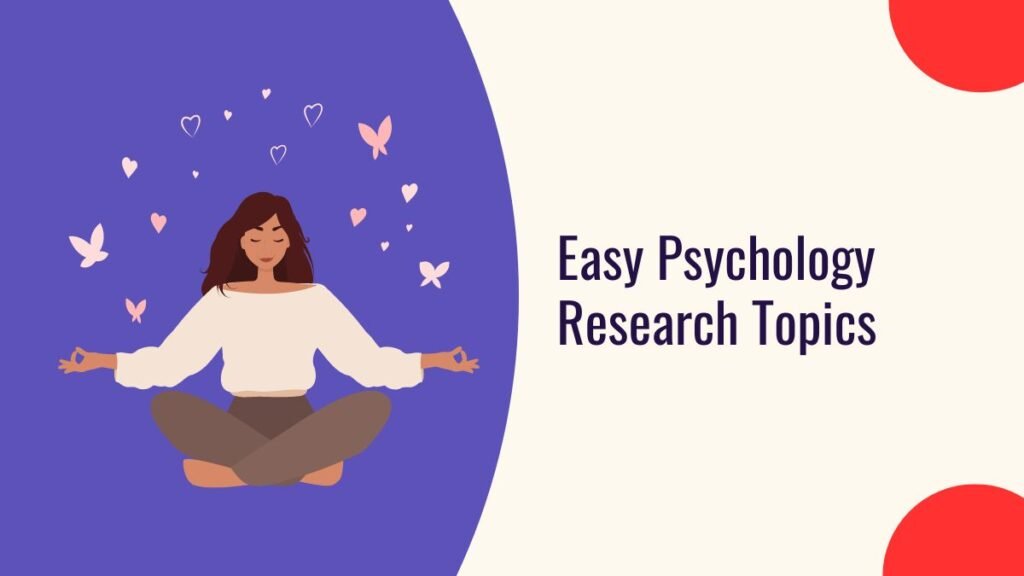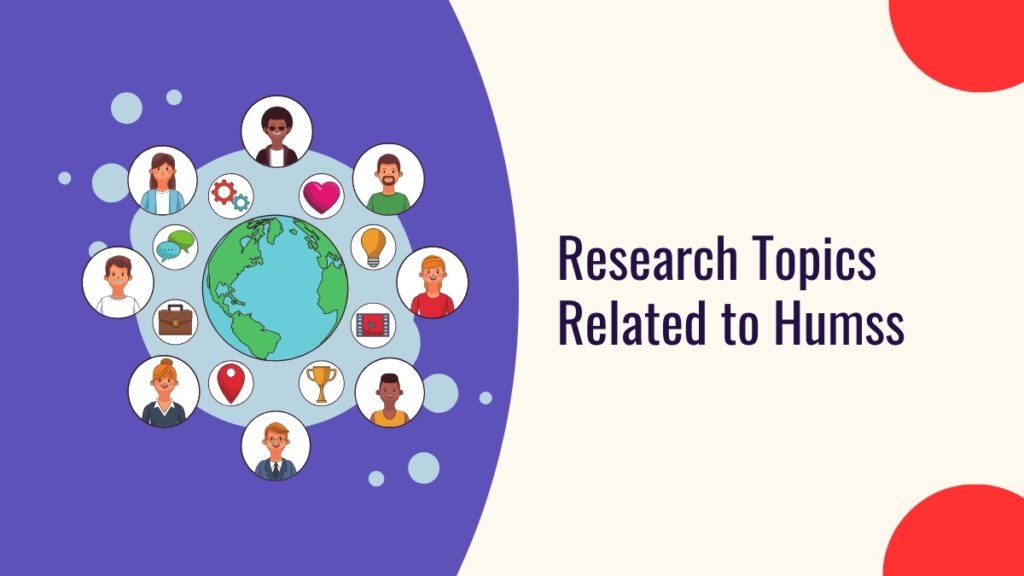Explore fun and easy psychology research topics! Perfect for students or anyone curious about how the mind works, this guide offers simple ideas on how emotions, social media, and childhood experiences affect our behavior. Start learning about human behavior today!
Are you curious about how the mind works? Picking the right psychology research topic can be a fun and interesting experience! Whether you’re a student searching for an easy project or just want to learn more about psychology, this guide will help you find simple and engaging topics.
Psychology covers many areas, like how our feelings are affected by colors or how social media impacts our relationships. You can look into how stress affects memory or how childhood events shape who we become as adults. These topics help you understand psychological ideas and see how they relate to real life.
Let’s explore these easy psychology research topics that can spark your interest and inspire you to learn more about human behavior!
Easy Psychology Research Topics PDF
Definition and Scope of Psychology Research
Psychology research looks at how the mind works and how people behave. It studies things like mental health and thinking. The goal is to understand why people feel and act the way they do.
Types of Psychology Research
There are four main types of psychology research:
- Experimental Research: Changes something to see what happens.
- Correlational Research: Checks how two or more things are related.
- Descriptive Research: Tells about a specific group or situation.
- Qualitative Research: Asks people about their thoughts and feelings.
How do I choose a research topic for psychology?
Picking the right psychology research topic is important. Here are some easy tips to help you choose:
- Pick What You Like: Choose a topic that interests you. It will make your research more fun.
- Be Specific: Focus on a specific area, like anxiety or social media. This makes it easier to study.
- Check for Resources: Make sure there are enough books or articles about your topic. This helps you find information.
- Think About Importance: Choose a topic that is important or popular right now. This makes your research more meaningful.
- Ask for Help: If you’re unsure, ask your teacher or friends for ideas. They can help you find a good topic.
Following these tips can help you choose an interesting and easy psychology research topic!
Easy Psychology Research Topics
Here are some easy psychology research topics:
Developmental Psychology
- Effects of parenting styles on kids’ behavior.
- How childhood experiences shape adult relationships.
- The importance of play in child development.
- The impact of screen time on kids.
- How siblings influence personality.
- Effects of attachment styles on relationships.
- Parenting practices in different cultures.
- Impact of divorce on children.
- Role of education in child growth.
- Effects of bullying on self-esteem.
Social Psychology
- How social media affects self-esteem.
- Group behavior and decision-making.
- Effects of stereotypes on actions.
- Impact of peer pressure on teens.
- Groupthink in decision-making.
- Social identity and group behavior.
- The role of conformity in daily life.
- Effects of social support on mental health.
- Cultural influences on social behavior.
- How first impressions matter.
Cognitive Psychology
- Memory techniques for better learning.
- How emotions affect decisions.
- Effects of multitasking on work.
- The role of sleep in memory.
- How attention impacts memory recall.
- The influence of context on memory.
- Aging and cognitive function.
- Effects of stress on decision-making.
- How visualization helps memory.
- Understanding cognitive biases.
Clinical Psychology
- Benefits of therapy for mental health.
- How stress affects physical health.
- Impact of mindfulness on anxiety.
- Different treatments for depression.
- Importance of self-care for mental health.
- Effects of therapy on anxiety disorders.
- How gratitude improves well-being.
- The role of medication in mental health.
- Social support and recovery.
- Journaling for emotional health.
Educational Psychology
- How teaching styles affect learning.
- The role of motivation in school.
- Test anxiety and student performance.
- Benefits of group work in learning.
- Importance of feedback in school.
- How visuals enhance learning.
- Classroom environment and behavior.
- Online learning vs. traditional learning.
- Growth mindset and academic success.
- Peer tutoring benefits.
Health Psychology
- Exercise’s impact on mental health.
- Nutrition and mood connection.
- Chronic illness and mental well-being.
- Support systems in health coping.
- Stress and physical health effects.
- Lifestyle changes for mental health.
- Sleep’s role in emotional health.
- Mindfulness for stress relief.
- Health education and behavior change.
- Smoking’s effects on mental health.
Personality Psychology
- Personality traits and relationships.
- Culture’s influence on personality.
- Personality and job satisfaction.
- Introversion vs. extraversion in social interactions.
- Personality and leadership styles.
- Personality traits and academic success.
- Personality’s role in conflict resolution.
- Genetics and personality traits.
- Personality and decision-making.
- Personality’s impact on health behaviors.
Industrial-Organizational Psychology
- Workplace environment and productivity.
- Leadership styles and team performance.
- Job satisfaction and employee retention.
- Diversity in the workplace.
- Motivation and employee performance.
- Remote work and team dynamics.
- Organizational culture and behavior.
- Work-life balance and job satisfaction.
- Training’s impact on performance.
- Workplace stress and mental health.
Sports Psychology
- Visualization techniques for athletes.
- Stress effects during competitions.
- Motivation in sports training.
- Teamwork and performance in sports.
- Sports’ impact on mental health.
- Injuries and athletes’ mental health.
- Self-talk in sports performance.
- Coaching styles and athlete motivation.
- Competition’s effects on mental health.
- Exercise and self-esteem relationship.
Forensic Psychology
- Psychology behind criminal behavior.
- Mental illness and crime.
- Reliability of eyewitness testimony.
- Psychology in jury decisions.
- Childhood trauma and crime.
- Substance abuse and crime connection.
- Psychological profiling in investigations.
- Media’s impact on crime perception.
- Rehabilitation and reducing reoffending.
- Family dynamics and criminal behavior.
Environmental Psychology
- Nature’s effect on mental health.
- Urban design and social behavior.
- Environment and stress levels.
- Noise pollution and well-being.
- Green spaces and community health.
- Color’s influence on mood.
- Workspace design and productivity.
- Climate change’s mental health effects.
- Environmental factors and decisions.
- Aesthetics and well-being.
Cultural Psychology
- Culture’s influence on mental health views.
- Cultural background and coping strategies.
- The role of traditions in identity.
- Communication styles across cultures.
- Globalization and cultural identity.
- Cultural values and parenting.
- Emotional expression in different cultures.
- Acculturation effects on mental health.
- Festivals and community well-being.
- Language and thought processes.
Neuropsychology
- Brain injuries and behavior changes.
- Neuroplasticity and recovery.
- Brain function and memory.
- Aging and cognitive changes.
- Stress effects on the brain.
- Neurotransmitters and mood.
- Meditation’s impact on the brain.
- Sleep deprivation and performance.
- Diet’s effects on brain health.
- Substance abuse and brain function.
Positive Psychology
- Gratitude and happiness.
- Mindfulness practices for well-being.
- Kindness and mental health.
- Resilience in coping with stress.
- Positive affirmations and self-esteem.
- Goal setting and motivation.
- Laughter’s effects on mental health.
- Social connections and happiness.
- Optimism and health outcomes.
- Nature activities and well-being.
Cross-Cultural Psychology
- Cultural differences in conflict resolution.
- Cultural norms and mental health treatment.
- Collectivism vs. individualism in behavior.
- Emotional expression differences across cultures.
- Migration’s effects on identity.
- Cultural influences on child-rearing.
- Globalization’s impact on values.
- Cultural rituals and community bonding.
- Cultural heritage and identity.
- Cultural influences on behavior.
Child Psychology
- Effects of bullying on behavior.
- Attachment styles and childhood development.
- Family structure and child psychology.
- Parental involvement in academic success.
- Temperament and preschool behavior.
- Play therapy for emotional development.
- Anxiety in children.
- Children’s literature and emotional understanding.
- Divorce impact on children.
- Socio-economic status and development.
Aging Psychology
- Social isolation’s effect on older adults.
- Cognitive decline and daily living.
- Physical health and mental health link in aging.
- Community engagement for healthy aging.
- Nostalgia’s impact on well-being.
- Caregiving effects on mental health.
- Ageism and self-esteem in older adults.
- Lifelong learning for cognitive health.
- Retirement and mental health.
- Technology’s impact on communication in aging.
Behavioral Psychology
- Reinforcement and behavior change.
- Classical conditioning in real life.
- Behavior modification techniques in therapy.
- Habits and daily life.
- Punishment and behavior change.
- Environmental cues and habits.
- Modeling and behavior learning.
- Behavioral therapies for phobias.
- Rewards and motivation.
- Social norms shaping behavior.
Media Psychology
- Violent media effects on behavior.
- Advertising and consumer behavior.
- Reality TV’s impact on relationships.
- Social media and self-image.
- Media portrayal of mental health.
- News media and public opinion.
- Digital media’s impact on attention spans.
- Video games and social skills.
- Media shaping cultural norms.
- Media consumption and anxiety levels.
Experimental Psychology
- Color’s effect on mood.
- Distractions and cognitive performance.
- Sleep deprivation and decision-making.
- Context in memory recall.
- Music’s impact on concentration.
- Environmental factors and risk-taking.
- Group dynamics and problem-solving.
- Time pressure and decisions.
- Visual stimuli and perception.
- Familiarity in preference judgments.
Psychometrics
- Reliability of personality tests.
- Cultural factors in psychological assessments.
- Testing methods and results.
- IQ and academic success relationship.
- Self-report measures and bias.
- Assessment tools in therapy.
- Testing in education settings.
- Anxiety effects on test performance.
- Age and assessment outcomes.
- Socioeconomic status and test results.
Crisis Psychology
- Psychological impact of natural disasters.
- Trauma effects on emergency responders.
- Community support in crisis recovery.
- Media coverage effects on trauma victims.
- Crisis intervention reducing trauma effects.
- Sudden loss and mental health.
- War’s psychological effects on civilians.
- Childhood trauma and coping mechanisms.
- Resilience in overcoming crises.
- Stress during emergencies and decisions.
Child and Adolescent Psychology
- Peer relationships and behavior in teens.
- Self-esteem development in childhood.
- Social media and teenage identity.
- Academic pressure and mental health in teens.
- Extracurricular activities and social skills.
- Family dynamics and adolescent development.
- Mental health and substance use in teens.
- Bullying effects on self-image.
- Therapy for teen anxiety.
- Friendship quality and emotional well-being in teens.
Positive Youth Development
- Mentoring programs’ impact on youth.
- Community service and youth self-esteem.
- Sports and resilience in young people.
- Leadership programs and youth empowerment.
- Art and music benefits for youth mental health.
- Positive role models and youth behavior.
- Family support and youth success.
- After-school programs and academic achievement.
- Youth engagement in decision-making.
- Positive psychology in youth development.
Couples and Family Psychology
- Communication styles and relationship satisfaction.
- Conflict resolution skills and family dynamics.
- Family rituals and relationship strength.
- Financial stress and couples’ relationships.
- Parenting practices and family relationships.
- Infidelity effects on relationships.
- Therapy for improving couples’ communication.
- Cultural differences in family relationships.
- Technology’s impact on family dynamics.
- Shared experiences strengthening couples.
Community Psychology
- Community resources and mental health.
- Effects of social cohesion on well-being.
- Volunteer work and mental health.
- Support networks in communities.
- Community engagement and empowerment.
- Public spaces and community interaction.
- Mental health stigma in communities.
- Cultural diversity in communities.
- Community programs and youth development.
- Impact of social change on community mental health.
Occupational Health Psychology
- Workplace stress and employee well-being.
- Job satisfaction and mental health.
- Effects of burnout on performance.
- Work-life balance and health.
- Employee support programs and retention.
- Role of management in employee health.
- Health risks in specific occupations.
- Job design and worker satisfaction.
- Mental health resources in the workplace.
- Team dynamics and job performance.
Human Factors Psychology
- User experience in technology design.
- Safety in workplace environments.
- Human error and design flaws.
- Ergonomics and productivity.
- Training methods for safety compliance.
- Effects of stress on performance.
- Human behavior and product use.
- Designing for accessibility.
- Impact of environment on task performance.
- Cognitive load in task management.
Parapsychology
- Beliefs in the supernatural and behavior.
- Effects of belief in paranormal events.
- Psychology behind superstitions.
- Experiences of déjà vu and memory.
- Interest in paranormal activity and mental health.
- Dreams and psychological interpretation.
- Spirituality’s effects on well-being.
- Cultural beliefs about the afterlife.
- Placebo effect and belief.
- Mindfulness and experiences of the unexplained.
Environmental Stress Psychology
- Noise pollution effects on stress levels.
- Urban living and mental health.
- Green spaces and relaxation.
- Climate change anxiety.
- Pollution and health concerns.
- Effects of seasonal changes on mood.
- Nature exposure and stress reduction.
- Environmental disasters and mental health.
- Community responses to environmental stress.
- Coping strategies for environmental concerns.
Writing and Presenting Your Research
After choosing your psychology research topic, it’s time to write and share what you found. Here are some easy steps:
Organize Your Research
- Make an outline to plan what to write.
- Divide your research into sections: introduction, methods, results, and conclusion.
Write Clearly
- Use simple words and short sentences.
- Make your ideas easy to understand.
Use Examples
- Add examples to help explain your points. This makes it easier to relate to.
Add Visuals
- Use charts, graphs, or pictures to show your results. Visuals make your work more interesting.
Practice Your Presentation
- Go over your presentation a few times to feel confident.
- Practice in front of friends or family to get their feedback.
Engage Your Audience
- Ask questions to involve your audience.
- Be ready to answer their questions at the end.
By following these steps, you can write and present your psychology research clearly and easily!
Tips for Effective Presentation
Here are the tips for effective presentation:
| Tip | Description |
|---|---|
| Know Your Topic | Understand your material so you can talk confidently. |
| Keep It Simple | Use easy words and short sentences. |
| Practice | Go over your presentation a few times to feel ready. |
| Use Visuals | Add slides or pictures to make it more interesting. |
| Make Eye Contact | Look at your audience while you talk to connect with them. |
| Speak Slowly | Talk at a steady pace so everyone can follow. |
| Engage Your Audience | Ask questions to get the audience involved. |
| Stay Positive | Smile and show excitement about your topic. |
| Answer Questions | Listen to questions and answer clearly. It’s okay if you don’t know everything. |
| End Strong | Finish with a summary or a final thought that leaves an impact. |
These tips will help you give a clear and effective presentation!
Conclusion
In conclusion, choosing an easy psychology research topic can be a fun way to learn about how people think and act. There are many simple topics to explore, like how social media affects self-esteem or how childhood experiences influence adult relationships.
Think about what interests you the most. This will make your research more enjoyable and help you learn better. You can gather information through surveys, interviews, or by reading books and articles.
The goal is to have fun while learning about psychology and to share your own ideas. With focus and excitement, you’ll enjoy researching and build skills for the future. Happy researching, and enjoy your discoveries!



